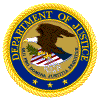

Prosecuted in Middle District of Florida
TAMPA -- The United States Attorney announced today that JOLENE HILDA
NEAT RECTOR and STEVEN MICHAEL SNYDER were both sentenced Friday afternoon
by District Court Judge James S. Moody, Jr., after having entered guilty
pleas to a two count indictment charging them with conspiracy to convey
trade secrets and the substantive offense of conveying trade secrets,
a case of first impression in the Middle District of Florida. RECTOR was
sentenced to 14 months confinement (seven months to be served in a community
correctional center), two years supervised release, and a special assessment
of $200. A fine was waived in her case. She had entered her guilty pleas
before Magistrate Judge Jenkins on March 13, 200l. SNYDER was sentenced
to 10 months confinement (five months to be served in a community correctional
center), two years supervised release, and a special assessment of $200.
A fine was also waived in his case. He had entered his guilty pleas before
Magistrate Judge Jenkins on March 2, 2001.
RECTOR, age 45, and SNYDER, age 36, each were convicted of conspiring
to convey trade secrets, in violation of 18 U.S.C. § 1832(a)(5),
and conveying trade secrets, in violation of 18 U.S.C. §§ 1832(a)(2)
and 2. Both offenses are crimes under the Economic Espionage Act of 1996
(EEA) and the prosecution of these offenses constitute the first ever
prosecution under this statute in the Middle District of Florida, one
of a growing number of prosecutions under this statute nation-wide since
the statute was enacted in October of 1996. This case has national significance
because it reenforces the impact Congress desired to make in limiting
the damage industrial espionage causes United States companies, both here
and abroad.
The facts, as agreed to by both defendants in their plea agreements with
the United States, establish that at some time prior to August 20, 1999,
the defendant, JOLENE HILDA NEAT RECTOR, obtained numerous pieces of proprietary
information owned by R.P.Scherer, Inc. (RPS) from a friend(s) in Florida.
This information included gel formulas, fill formulas, shell weights,
and experimental production order (EPO) data. This information was known
by the defendant to be proprietary information and trade secrets of RPS.
RPS is a leading international developer and manufacturer of drug, supplement,
cosmetic and recreational product delivery systems. RPS’s proprietary
advanced drug delivery systems improve the efficacy of drugs by regulating
their dosage, rate of absorption and place of release. RPS customers include
global and regional manufacturers of prescription and over-the-counter
pharmaceutical products, nutritional supplements, cosmetics and recreational
products such as paint balls. RPS products are produced for and placed
in interstate and foreign commerce.
Both RECTOR and SNYDER admitted that the gel formulas, fill formulas,
and EPOs were proprietary trade secrets of RPS, developed by them and
used by them in the production of drug, nutrient supplement and paint
ball delivery systems (capsules) as well as the fill material inside the
capsules.
The investigation of this case was accomplished through the collaborative
efforts of Special Agents of the Federal Bureau of Investigation in Michigan,
Nevada, and here in the Middle District of Florida. This case also demonstrates
a situation where a competitor corporation (NPB) actively cooperated with
federal authorities and the victim corporation (RPS). Without the assistance
of this competitor corporation, the successful prosecution of this case
would not have been possible.
The case was prosecuted by Assistant United States Attorney Donald L.
Hansen, Computer Technology Crimes Coordinator for the Tampa Division
of the United States Attorney’s Office.
###